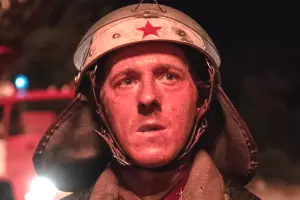Peak TV meets "Must-Endure TV" with Chernobyl and When They See Us
-

"Immersive re-creations of historical horrors from the 1980s—a Soviet nuclear meltdown, a grotesquely racist miscarriage of justice in New York—these tales of system failure offer a new type of Must-See TV: let’s call it Must-Endure TV," says Joy Press of the two limited series: Chernobyl from Craig Mazin and Ava DuVernay's When The See Us. "The genius of these shows is the way they carry out the traditional work of a documentary under the guise of entertainment." Chernobyl, she says, "is a stunning spectacle whose gorgeously eerie visuals rival any CGI-powered sci-fi blockbuster. Although its dowdy, chain-smoking protagonists are physicists, bureaucrats, and disaster-area cleanup operatives, the show’s multiple deftly threaded plotlines are as knife-edge-tense as any Bourne thriller. In Ava DuVernay’s four-part When They See Us, the emphasis is on heartrending acting rather than gut-pummeling action, but it makes for grimly compelling viewing. These are effectively traumas to which you look forward, bummers to binge on." Chernobyl and When They See Us also are timely with their simultaneous arrivals. "As much as these miniseries historically reconstruct late-20th-century events and brilliantly re-create the look and feel of everyday life at that time, they also hark back to the serious television fare of the 1970s, when (miniseries) Roots and Holocaust served as edutainment, convulsing a generation of viewers in a painful conversation about American slavery and World War II genocide. Like those harrowing but hugely successful series, Chernobyl and When They See Us trigger conflicted responses: We succumb to the seduction of a masterfully told tale while we’re chastened by the responsibility to bear witness...Both serve as oblique meditations on the collapse of gigantic notions of national destiny, whose wreckage lies all around us."
ALSO:
- Is Chernobyl HBO's best miniseries ever?: "From Band of Brothers to Angels in America to Generation Kill, HBO has been the home to TV’s most buzzy miniseries for decades," says Adam Epstein. "All shows that air on HBO have an air of prestige to them, but miniseries even more so. HBO’s miniseries tend to look back at important moments in history and culture with all the top-notch production values and cinematic verve that the pay-cable network can muster. Chernobyl is certainly no different."
- Russia state propaganda outlet Russia Today explains what "What HBO got wrong": RT.com interviewed 85-year-old Major General Nikolay Tarakanov, who watched the entire HBO miniseries. Tarakanov, who was played by Scottish actor Ralph Ineson, calls Chernobyl "complete nonsense."
- Instagram influencers are now flocking to the Chernobyl site
- How much of the response to Chernobyl is to its quality vs. the moment we're living in?
TOPICS: Chernobyl, HBO, Netflix, When They See Us, Ava DuVernay, Craig Mazin
More Chernobyl on Primetimer:- The "Evil Russian" stereotype has persisted on shows like Devs, despite "humanizing" Russian portrayals on The Americans and Chernobyl
- Republican Congressman Dan Crenshaw: Liberals don't like nuclear energy "because they watch The Simpsons or Chernobyl"
- How TV show companion podcasts became all the rage
- Chernobyl star Paul Ritter dies at 54
